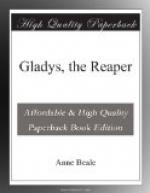’Oh, my dear child! when will it please the Lord to soften your heart, and teach you that all men and women are brothers and sisters.’
‘Never, I’m sure, in that kind of way.’
Whilst the mother and daughter continue their conversation about Gladys, of which the above is a specimen, we will glance at Janetta Prothero, the spoilt daughter of Glanyravon Farm.
She is decidedly a pretty girl? some might call her a beauty. She has dark eyes, black hair, a clear pink and white complexion, a round, dimpled cheek, a fair neck, a passable nose, and a very red-lipped, pouting mouth. She is small of stature—not much taller than her mother—but so well-formed, that her delicate little figure is quite the perfection of symmetry. Her movements are languid rather than brisk like her mother’s, and she either has, or is desirous of having, more of the fine lady in her manners and appearance. We discern, as she talks, more of obstinacy than reason, and more of pride than sense, in her conversation, and the face rather expresses self-will than intellect, although not deficient in the latter.
We are led to suppose, from the appearance of the room in which the mother and daughter are located, that Miss Janetta is somewhat accomplished; more so than young ladies in her position commonly were some thirty or forty years ago. This is a large parlour, with some pretensions to be called a drawing-room. True, the furniture is of old-fashioned mahogany, the sofa of hair, the curtains of chintz, and all that appertains to the master and mistress of the house, of solid but ancient make. But the square piano, the endless succession of baskets, card-racks, etc., the footstools with the worsted-work dog and cat thereon emblazoned, the album and other books, so neatly and regularly placed round the table, and above all, three heads in very bad water-colours that adorn the walls—all proclaim the superior education of the daughter of the house, and her aspirations after modern gentility.
We will just take up the thread of the conversation of the mother and daughter at the end of it, and see what conclusions they have arrived at. In a somewhat doggedly excited tone, Miss Janetta says,—
’Well, mother, I know that father would be very angry, and that she might give us all low Irish fever. I shouldn’t wonder if she brought a famine with her.’
’Remember, Netta, who said “and if ye have done it unto the least of these my brethren, ye have done it unto me."’
’If those people are one’s brethren, as father says, the sooner we disown our relations the better.’
Whilst Miss Janetta was uttering this unchristian speech, and greatly shocking her mother thereby, a young man entered with a book in his hand, and throwing himself on the sofa, began to read. It was soon, however, evident that he was listening to the conversation, although he professedly kept his eyes on his book. Poor Mrs Prothero continued her efforts to enlist her daughter on the side of charity, but did not greatly prevail. The young man did not interfere, probably being aware that it is better to let two women finish their own quarrel.




